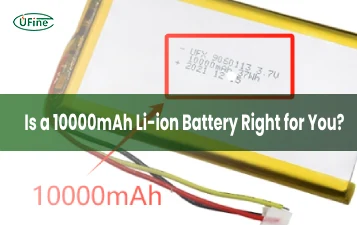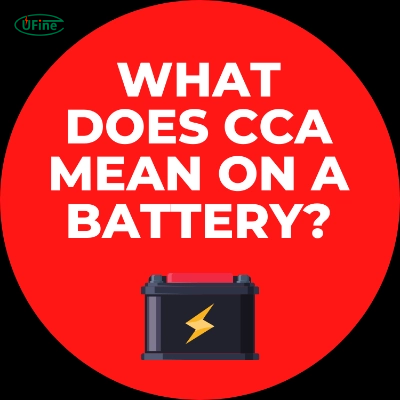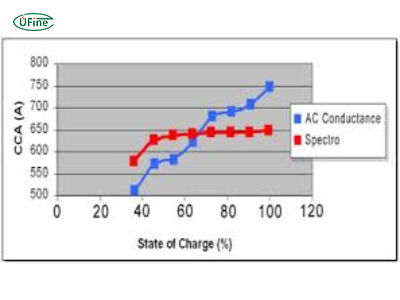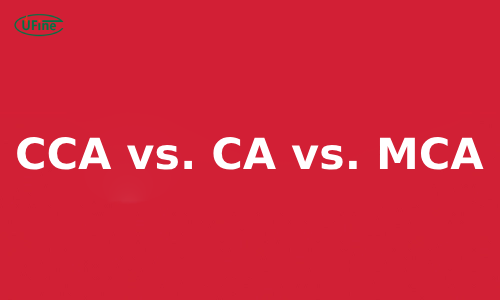A CCA battery is a type of car battery that helps start your car in cold weather. This article explains what Cold Cranking Amps (CCA) are and how they work. We’ll also compare CCA with other battery ratings and help you choose the right one. Plus, you’ll learn the benefits of high CCA batteries and how to care for them.
Part 1. What is a CCA battery?
A CCA battery (Cold Cranking Amps) measures a battery’s ability to start an engine in cold weather by delivering power for 30 seconds at 0°F without dropping below 7.2 volts. A higher CCA means better performance in freezing temperatures, essential for vehicles in cold climates.
Part 2. How does CCA rating work?
The CCA rating is a measure of a battery’s cold-weather performance. Here’s how it works:
- Definition: CCA indicates how many amps a battery can deliver at 0°F for 30 seconds without dropping below 7.2 volts.
- Testing Method: Batteries are tested in cold chambers at 0°F, measuring their performance during a 30-second interval.
- Higher CCA: A higher CCA means better cold-starting power, making the car more reliable in winter.
Factors Affecting CCA Rating
Battery Chemistry:
- Lead-Acid Batteries: These are the most common car batteries. They usually have a CCA rating ranging from 400 to 800 amps. They are reliable in cold weather but need regular maintenance.
- Absorbent Glass Mat (AGM) Batteries: AGM batteries often have a higher CCA rating, typically between 650 and 950 amps. They are more efficient and have better longevity.
- Lithium-Ion Batteries: These batteries are lighter and usually have a high CCA rating, often exceeding 1000 amps. They perform well in cold weather but are more expensive than lead-acid batteries.
Temperature:
- Cold Weather: Batteries lose power in cold weather. The CCA rating is critical because it shows how well the battery can perform in low temperatures.
- Warm Weather: CCA is less critical in warmer climates but still indicates the battery’s overall power.
Design:
- Plate Size and Number: More plates inside the battery generally mean a higher CCA rating. Some batteries have up to 20 plates per cell to boost the CCA.
- Internal Resistance: Lower internal resistance means higher CCA. Batteries designed with low internal resistance can deliver more power quickly.
Age and Maintenance:
- Battery Age: As batteries age, their CCA rating decreases. Regular testing helps monitor the CCA rating over time.
- Maintenance: Keeping battery terminals clean and charging the battery helps maintain its CCA rating. Corrosion and dirt can lower the CCA.
Quality of Materials:
- Lead Purity: High-quality lead improves the CCA rating. Pure lead conducts electricity better, providing more power.
- Electrolyte: The type and quality of the electrolyte used in the battery also affect the CCA. High-quality electrolytes ensure better performance.
Part 3. CCA vs. CA vs. MCA
Differentiating CCA, CA, and MCA
Cold Cranking Amps (CCA):
Definition: CCA measures the battery’s ability to start an engine in cold temperatures. It shows how many amps a battery can deliver at 0°F for 30 seconds without dropping below 7.2 volts.
Usage: CCA is crucial for vehicles in cold climates. It ensures your car will start even when it’s freezing outside.
Cranking Amps (CA):
Definition: CA, also known as Marine Cranking Amps (MCA), measures the battery’s ability to start an engine at 32°F. It shows how many amps a battery can deliver at the freezing point for 30 seconds without dropping below 7.2 volts.
Usage: Marine batteries and some warmer-climate vehicle batteries use CA. It is less critical than CCA in icy conditions but still crucial for engine starting.
Marine Cranking Amps (MCA):
Definition: MCA is similar to CA and measures a marine battery’s ability to start an engine at 32°F. It shows how many amps a battery can deliver at the freezing point for 30 seconds without dropping below 7.2 volts.
Usage: MCA is used explicitly for marine batteries. It ensures boats and other aquatic vehicles can start reliably in mildly cold conditions.
Compare CCA vs. CA vs. MCA
Temperature Conditions:
- CCA: Tested at 0°F, making it essential for cold weather performance. It ensures your vehicle starts in harsh winter conditions.
- CA/MCA: Tested at 32°F, suitable for milder climates and marine applications. They are less stressed by extreme cold but must perform in more excellent conditions.
Applications:
- CCA: Ideal for cars, trucks, and other vehicles used in cold climates. It helps you choose a battery that will start your engine reliably in winter.
- CA: Often used for vehicles in moderate climates where extreme cold is rare. Some marine applications also use it where starting power is essential.
- MCA: Specifically designed for marine vehicles like boats. It ensures that a reliable engine starts in aquatic environments. It can be more relaxed but warmer than winter on land.
Battery Design:
- CCA: Batteries with high CCA ratings often have more or thicker plates to provide the necessary power in cold conditions.
- CA/MCA: These batteries may have fewer or thinner plates than high CCA batteries, as they are not required to perform in frigid temperatures.
Performance Metrics:
- CCA: Indicates how well a battery performs under severe cold conditions. High CCA is critical for reliability starting in winter.
- CA: Measures performance at a more moderate temperature, reflecting average cold conditions rather than extreme cold.
- MCA: Similar to CA but tailored for the marine environment, ensuring that marine engines start reliably.
Durability:
- CCA: Manufacturers often build batteries with high CCA to withstand repeated cold starts
- CA/MCA: These batteries are typically designed for more moderate conditions and may not be as robust as high-CCA batteries.
Voltage Stability:
- CCA: Ensures the battery maintains a voltage of at least 7.2 volts at 0°F, critical for starting engines in cold weather.
- CA/MCA: Ensures the battery maintains the same voltage at 32°F, which is essential but less challenging than the CCA requirement.
Cost:
- CCA: High-CCA batteries can be more expensive due to their robust construction and performance capabilities.
- CA/MCA: These batteries are often less costly, reflecting their use in less demanding temperature conditions.
Suitability for Other Equipment:
- CCA: High-CCA batteries are also suitable for heavy-duty vehicles and equipment used in cold environments.
- CA: Suitable for standard automotive use in moderate climates and some marine applications.
- MCA: Specifically designed for marine applications, ensuring reliable starts for boats and other watercraft.
CCA vs. CA vs. MCA Comparison:
| Rating Type | Test Temperature | Ideal Usage | Typical Amps |
|---|---|---|---|
| CCA | 0°F | Cold climates, winter driving | 400-1000 amps |
| CA | 32°F | Moderate climates | 350-900 amps |
| MCA | 32°F | Marine applications | 400-1000 amps |
Part 4. How to choose the right CCA battery?
- Consult your vehicle’s manual to determine the recommended CCA rating.
- Consider your region’s climate—if temperatures drop below freezing, choose a battery with a higher CCA rating.
- Look for a brand known for quality, such as [Brand X], for reliability in cold conditions.
- Make sure the battery fits in your vehicle’s tray for secure installation.
- Check for extended warranties and customer reviews to ensure reliability.
Part 5. Benefits of high CCA batteries
- High CCA batteries start your car reliably in cold weather.
- They handle the demands of modern vehicles with ease.
- These batteries last longer, saving you money over time.
- They provide the power needed for trucks and SUVs.
- Reliable starts reduce the risk of being stranded.
- Many high CCA batteries come with extended warranties.
- Many models require little to no maintenance.
- They deliver power more efficiently due to lower internal resistance.
Part 6. Caring for CCA batteries
- You should check for cracks, leaks, and corrosion around the terminals.
- Use baking soda and water to clean corroded terminals.
- Avoid overcharging or undercharging the battery.
- Securely mount the battery in the tray.
- Protect the battery from extreme heat and cold.
- Try to avoid short trips that can prevent the battery from fully charging.
- Turn off lights and electronics when the engine is off to avoid draining the battery.
- For non-maintenance-free batteries, check and maintain water levels.
Artikel Terkait: How to Check Car Battery Life?
Part 7. Final words
Choosing the correct CCA battery is crucial for reliable vehicle performance, especially in cold climates. High CCA batteries offer many benefits, including better starts and longer lifespan, while regular care ensures they last even longer.
Related Tags:
More Articles

10000mAh Battery Explained: How Long It Lasts, How It Works
A full guide on 10000mAh li-ion batteries, voltage, usage time, and tips. Discover how a 10000mAh battery works, how long it lasts, and how to choose.
10440 Battery Guide: Size, Voltage, Capacity, Uses & More
Understand 10440 batteries better—size, voltage, safety, and how they compare to AAA. Find the best fit for your high-performance devices.
White Stuff on Battery Terminals: A Step-by-Step Cleaning and Maintenance Guide
White stuff on battery terminals is corrosion. Learn how to clean it safely, prevent damage, and keep your battery running strong with simple steps.
Understanding How Glass Mat Batteries Work: Technology, Benefits, and Limitations
Glass mat batteries power cars, RVs, and solar systems. Learn how they work, their benefits, and what to consider before choosing one.
A Buyer’s Guide for AA Size Lithium Battery
Discover the power of AA size lithium batteries—types, voltage, capacity, and more! Learn how to choose the best one for your needs. Read now!






